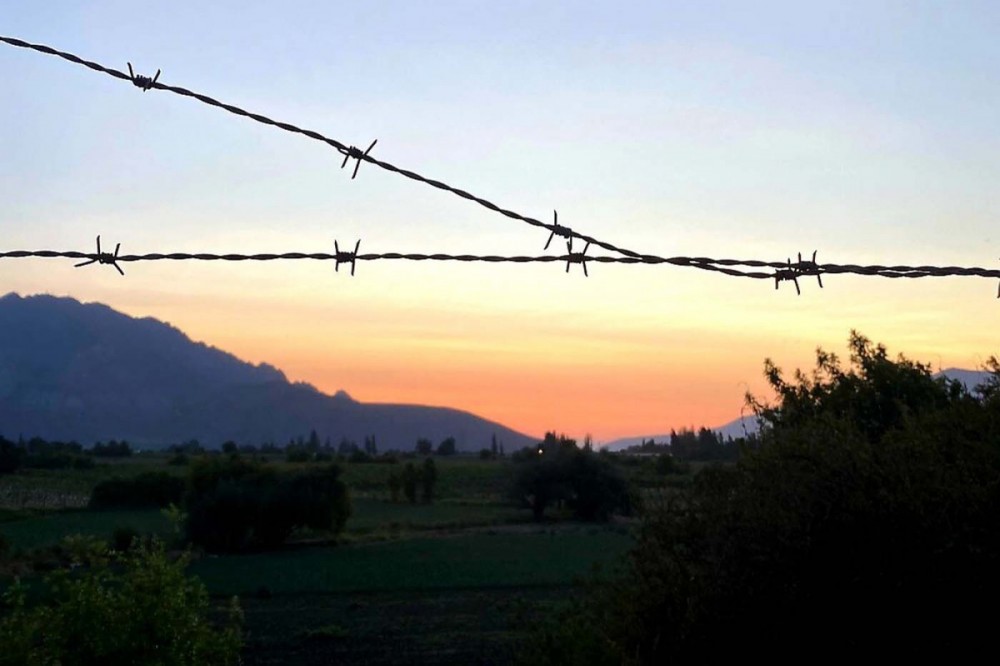I know that our collective focus has landed on COVID-19 in the last month. But in the midst of it, about the same time as the Global North started to focus on this disease almost to the exclusion of everything else going on in the world, thousands of refugees who had been living on the edge in Turkey were on the move.
As I write this, desperate people in the no man’s land that makes up the border between Greece and Turkey are on my TV screen, some with their hands up in the air, some clutching small children, others carrying pitifully small bags of personal possessions, as waves of white tear gas waft towards them from the lines of riot-gear-wearing, machine-gun-wielding Greek police.
European officials contend that this terrible situation is Turkey’s fault for opening the borders and allowing those who have been living in limbo in Turkey to approach the border with Europe. Turkey claims that, given the lack of financial and political resources coming from Europe, it is no longer able to keep migrants who wish to leave for the EU locked within its own borders. There is blood on all sides here.
Desperate Populations
European nations paid off Turkey in 2015 to restrain migrants within its own borders, often looking the other way when Turkish authorities used the kind of force upon desperate populations that these nations themselves want to avoid being seen employing. But this kind of arrangement has always given rise to the question: if you employ a poorer agent to do your dirty work for you, are you not still responsible, ethically and morally?
Turkey, with its own goal of ultimately being allowed to join the European Union, played ball as long as the money kept flowing — the EU offered $6B euros ( almost $9B Canadian). And the world has long been aware that Turkish police and border security are not known for being particularly humane with migrants from Syria or indeed, anywhere else, who have made it as far as their borders.
Millions of Syrians have been displaced both internally and internationally since the Syrian civil war began in 2011. Almost five million people have fled the war-torn country in successive waves of migration that have mirrored the violence of the war. They join the other millions of dispossessed and displaced people from Afghanistan to Zimbabwe who are looking for safety and security. Many of these folks end up at the borders of Europe, the nearest more-or-less safe and more-or-less economically viable place. Although almost four million refugees live in Turkey, and another million are scattered between other poorer Middle Eastern nations like Lebanon and Jordan, many refugees see the EU as a safe haven. But the EU definitely does not want them.
The meddling in the internal politics of the Middle East for decades past by the EU, the U.S., and the Global North in general has had run-on impacts in Syria, in Turkey, in Libya, in Iraq, in Yemen, in Palestine, in Egypt. . . . The list goes on and on.
Playing Politics with Refugees' Lives
For so long, Western countries have been playing politics with the lives of refugees. They hold conferences, they offer internal support, which is a polite way of sometimes strengthening the borders of failed states, or they pressure poorer mediating border states to contain migrants and refugees for them. It was the EU that struck the deal with Turkey in 2015, but Italy struck its own deal with Libya. And if anything, Libya’s attempts to cordon off refugees and migrants have been harsher and more violent than Turkey’s.
Countries in the EU play by the letter of the law rather than by the spirit of the law to prevent refugees from actually reaching their shores — because there are real obligations under international law to refugees who actually reach their borders. Indeed, when they are not able to buy themselves out of their international obligations, they actually go further. Greece announced in early March that it will suspend the EU’s own agreed-to asylum laws for a month. Refugees who reached Greek borders after March 1st are being turned away, even though this is a blatant violation of EU law and of all international human rights obligations. Video from Greece appearing to show Greek military firing shots dangerously close to refugees in inflatables and dinghies also suggests that Greece’s decision may be in violation of the international law of the sea.
The COVID crisis has just made things worse. None of the best practices prescribed by the World health Organization (WHO) and every public health agency — practice physical distancing, wash your hands frequently with soap and water, use alcohol-based gel cleansers, stay indoors — are possible for the vast majority of people who are stuck in these circumstances.
Unspeakably Crowded Camps
The migrant camps that people left in their dash to the border, hoping to make it into Europe, were unspeakably crowded to begin with; at the border, they found themselves living without any facilities, cooking and washing in the Evros River if they were lucky, and in muddy pools if they were not. The most recent reports are that the Turkish border post — Pazarkule — has been closed because of COVID-19; the few shops in the village nearby are closed down and most local residents have barricaded themselves inside. The Greek border post — Kastanies — has not been opened. The Turkish appear to have let some of the refugees return to Istanbul, but many remain stranded there, having given up what access to housing or work they had before attempting to cross the border into Europe.
The situation will worsen. It is hard for us in the Global North, preoccupied as we are with the situation unfolding in our own backyards, to even imagine the impact of COVID-19 in the overcrowded refugee camps (on the Greek islands alone, camps meant for about 5,500 people have over 40,000 people living in them), never mind the conditions of life for those who don’t even have access to those camps. But we cannot turn away from this reality.
A Genocidal History of Colonization
Given the history of Europe — from its nations’ long and genocidal histories of colonization and imperialism, to the world wars, to their fascist dictatorships (think Germany, Greece, Portugal and Spain), all of which led to millions of Europeans leaving for North and South America as refugees (and as economic migrants, for that matter) between the 1920s and the 1990s – it ill behooves them to thumb their noses at those who are now on their own doorstep. Indeed, it is a stunning refusal to acknowledge the histories of most European nations in the 20th century for them to have the arrogance to try to turn away those who are literally dying to gain access to Fortress Europe — for many of the same reasons European citizens once left this very continent in their tens of thousands.
Two days after fascists burnt down warehouses of supplies in the Greek islands in early March, thousands of Greeks rallied in Athens in support of migrants and refugees and began to collect more supplies. But the other truth is that Greek citizens, themselves fed up with austerity policies of their new right-wing government, have also been leading citizen-patrols along the border. Journalists have witnessed assaults by these groups on arriving refugees, and have themselves been targeted and physically attacked.
How the European Union decides to pay for the care and protection of refugees is unimportant. If we have learnt one thing from the response to COVID-19, it is that when governments decide to, they can move mountains. Italy is nationalizing Alitalia; Spain is bringing all privatized hospitals back under public control. This is about finding the political will.
The vast majority of the people in the no man’s land between Turkey and Greece are clearly not looking to stay in Greece. They will know, from those who came before them, about the desperate circumstances of the refugees who are already living in squalid conditions in camps in places like Lesbos and Chios. And it is not as though Greece has not suffered too. Greece’s own unemployment rate is one of the highest in the EU. Its politics are polarized: on the one hand, there was the short-lived bright hope of Syriza (the Coalition of the Radical Left) and on the other, there is the neo-Nazi, fascist Golden Dawn, which eggs on its supporters to scapegoat migrants and refugees for all of the structural problems that Greece has been unable to deal with for the past 40 years.
What we do know now, horrifyingly, is that hordes of Golden Dawn supporters have descended upon the Aegean Islands that are playing host to most of the recently arrived refugees and migrants in Greece and are terrorizing both these unfortunate people and their supporters as well as local Greeks there. It has been reported that Golden Dawn thugs have burnt down warehouses full of donated supplies for refugees in Lesbos as well as in Chios.
Soaring Unemployment and Despair
I have no time or sympathy for this but I do understand that the conditions of life for many people in Greece have become unbearable. Unemployment is soaring, pensions have been slashed time and time again, and there is no sign that things will improve. Unscrupulous, unethical, and frankly criminal politicians from the ultra-right are using the despair of Greek people to target the even more desperate people who are streaming through from Turkey or boarding dinghies from North Africa.
The kindest reading of Europe’s middling centre-left parties’ inept attempts to bribe unsavoury political partners like Libya and Turkey into containing the collateral damage to people of decades of war and destruction is that the arrival of tens of thousands, and sometimes hundreds of thousands, of refugees provides fodder to their own internal neo-Nazis and fascist sympathizers. Golden Dawn in Greece is not alone.
Anti-immigrant, Islamophobic politics and political parties are on the rise across Europe. France has been struggling with this (Marine Le Pen of the National Front, now known as the National Rally, received 33 per cent of the presidential vote in 2017) as is Spain (Vox, the ultra-nationalist splinter from the old right-wing People’s Party here holds 52 of 350 seats in the federal parliament). And as for the United Kingdom, it is not an exaggeration to note that Brexit, and its chaos, is a dire economic consequence of the rise of UKIP, the right-wing, populist “independence” party. Germany and the Netherlands are struggling with their own versions of ultra-nationalist, racist political forces. In fact, it would be a shorter list to try and come up with the names of the countries that are not struggling with populist, race-baiting, right-wing extremists.
But trying to appease such extremists by turning away from legal obligations under human rights treaties, as well as from any basic tenets of what is owed to human beings, is a complete abnegation of political responsibility by the EU and by individual European nations.
The vast majority of Europeans who support these extremist parties do so because they feel that they have been abandoned by the moderate right, the centre-right and yes, even the centre-left. What people want is security for themselves – economic and social and environmental. If they know that they are not under threat themselves, if they can see that their lives are not disposable, if they can imagine a better future for their children than their own current realities — in fact, if they have any trust left in their elected politicians’ ability to manage their futures collectively and sustainably — they would not be baying for the blood of migrants and refugees.
Time for a Collective Answer
This situation is as much a failure of political imagination — generations of government have abandoned their European citizens — as it is any essential turn to the right within the European citizenry. After all, many, many Europeans have, within their own lived memories, similar stories of family and friends escaping war, repression and abject poverty.
This is clearly a problem that Europe needs to come to terms with as a whole. There is no solution here that does not involve Europe coming up with a collective answer for those who are already its citizens but feel disenfranchised and unheard, as well as for those thousands and perhaps tens or hundreds of thousands who have been displaced by decades of war and political instability, and condemned by the most powerful nations in the world to live within failed or failing nation-states.
Here is the most immediate reality that we cannot and must not turn away from, no matter how gut-wrenching the images from the frontlines: it is not acceptable for some of the richest countries in the world to turn their backs collectively on some of the most vulnerable people in this world. Yes, COVID-19 is an urgent crisis that is devastating communities in Europe but that does not mean that the refugee crisis unfolding on its borders can be forgotten.
Archana Rampure lives in this land we call Canada.















